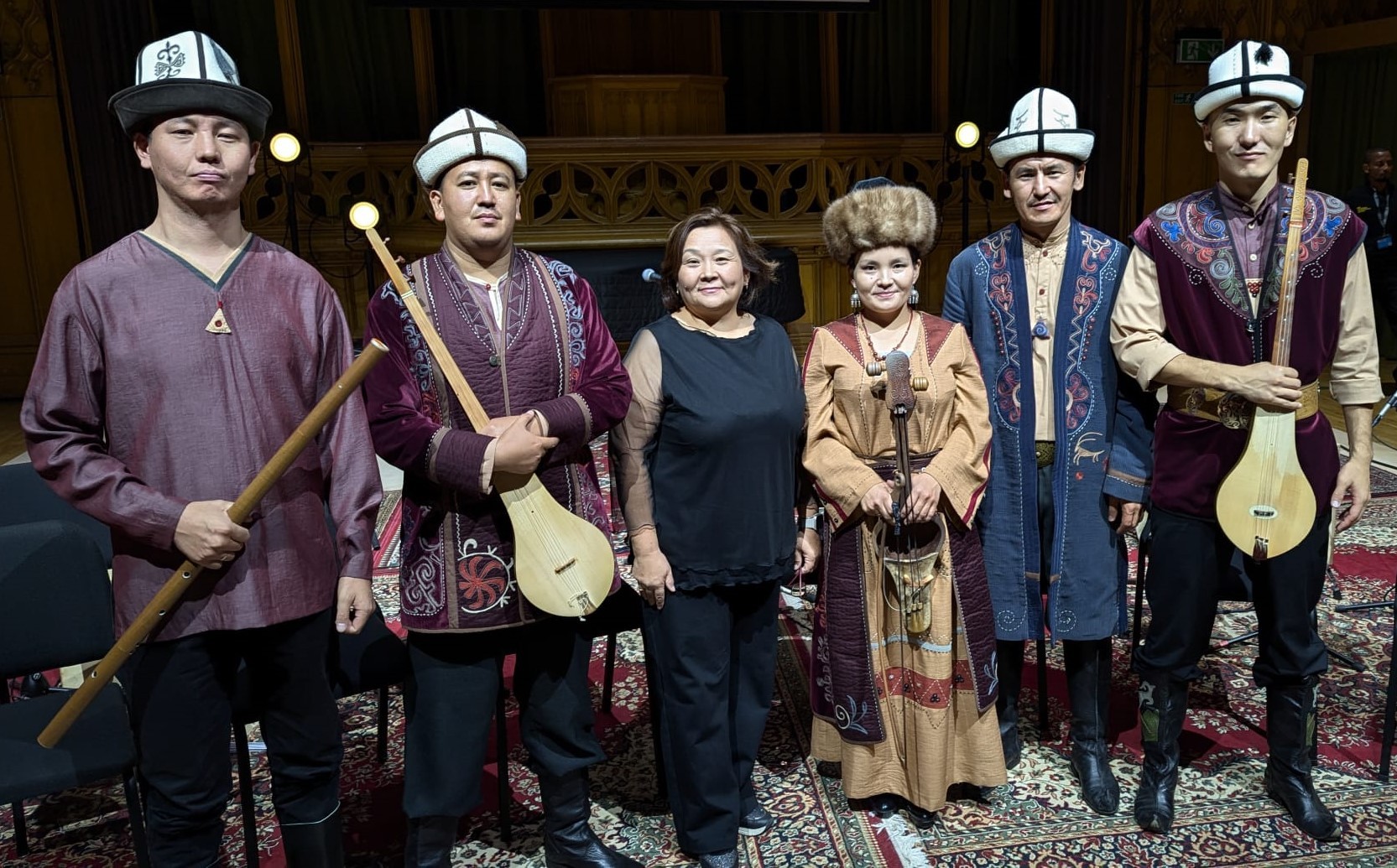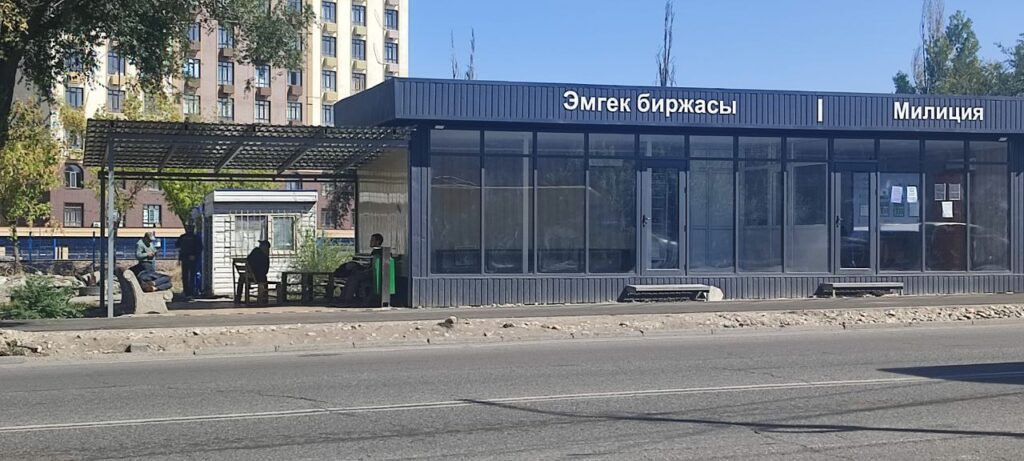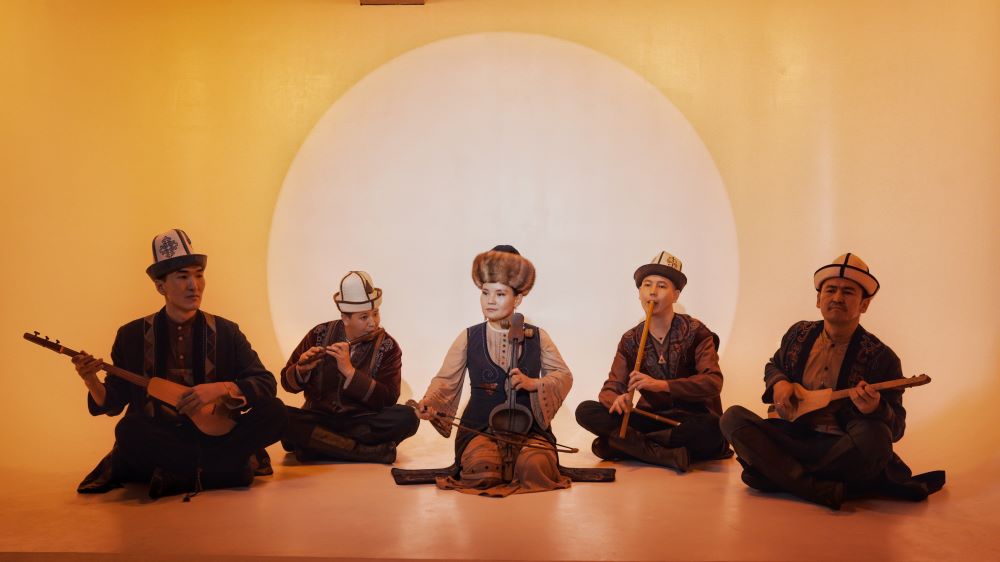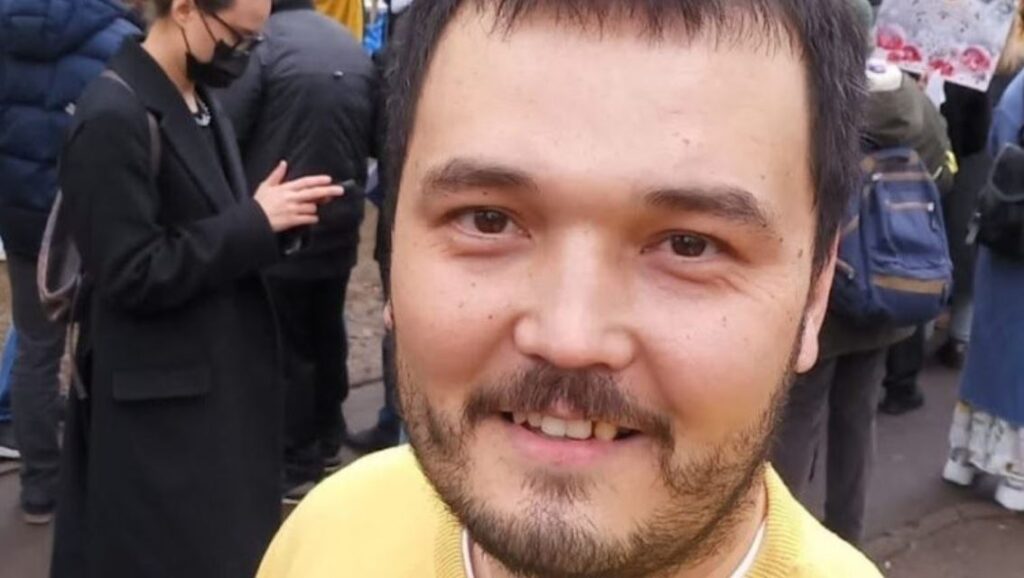On August 13, Kyrgyzstan’s Ustatshakirt Ensemble, a five-piece group of traditional musicians, gave its first ever performance at Edinburgh’s International Festival.
Following a mesmerizing, sell- out concert, Kyrgyz author Shahsanem Murray spoke on behalf of TCA, to musicologist Razia Syrdybaeva about Ustatshakirt , its origins, aims and future plans.

Photo: TCA Razia Syrdybaeva and the Ustatshakirt Ensemble
TCA: Razia, please tell us a little about yourself and the Ustatshakirt Ensemble.
I am a musicologist, producer, and researcher of Kyrgyz culture, and hold a PhD in Philology. Twenty years ago, I established Ustatshakirt; an NGO educational organization with a mission to preserve Kyrgyzstan’s centuries-old musical heritage.
The name Ustatshakrit – Ustat meaning master, and shakirt, student – embodies our aim to serve as a bridge between old masters and young musicians.
Founded in 2003, with support from the Aga Khan Music Programme (AKA) the Ustatshakrit Center now has branches offering tuition in music, literature, and theatre to pupils in 41 primary & secondary schools across Kyrgyzstan.
Over the past twenty years, through the development of faster and more effective methodology, we have taught over 10,000 children to play traditional Kyrgyz instruments such as the komuz and temir ooz komuz. We also provide tuition in other performing art forms including basic theater skills in our ‘dramalab’, and singing epics.
The key goal of our work is to introduce children to their native music and help them appreciate and fall in love with their ancient culture. This is very important, especially in the present climate where exposed to external influences and technology, young people are increasingly moving away from their roots, their native language, and music. Attracted by modern rhythms and gadgets, they have little time and few opportunities to listen to their ancestral music.
To more effectively engage both our pupils and audiences, we are constantly implementing the development of special methodological textbooks, music notation programs, etc. Authored by our teachers, musicians and prominent figures in the Arts, our now comprehensive collection of publications is used by Kyrgyzstan’s music educational institutions, from children’s art schools to universities and conservatories.
TCA: Concerts of traditional Kyrgyz music accompanied by excerpts from the great Manas epic are rarely performed in the UK, and especially, Scotland. What challenges did you face in securing a venue at the Edinburgh Festival?
We heard about the festival several years ago. Getting to Edinburgh involved a lot of planning and expense and was only made possible thanks to the generous support of the Aga Khan Trust for Culture, the Aga Khan Music Program and its director Fairouz Nishanova, and our sponsors Sir Ewan & Lady Brown together with Flure Gossart.
Work on repertoires for international audiences has now been ongoing for two years, and over many months prior to playing at Edinburgh, we focused on creating a program that would embrace the rich traditions of Kyrgyzstan’s music and culture.
TCA: What were your impressions of the Edinburgh audience?
We were all delighted by the high level of interest expressed by the Scottish audience. We quickly realized that we have a lot in common with your culture and your strong relationship with the natural environment.
Much of Scotland’s musical culture is characterized by ballads, and Kyrgyz epics, the cornerstone of which is the heroic trilogy Manas-Semetey-Seitek, have long been presented in songs.
TCA: Manas is a legendary character; a beloved hero and symbol of the Kyrgyz people and their country. The concert included a powerful, almost hypnotic, oration of excerpts from Manas. Please tell us more about the traditional role of the manachy and the group’s five musicians.
Historically, the story of Manas – recognized as the world’s longest epic spanning over 500,000 lines – is presented from memory by a highly revered manachy as a solo performance, sometimes over several days, without instrumental accompaniment.
The excerpt selected for Edinburgh, one of the most popular and dramatic, tells how Manas’ widow Kanykei watches a horse race with baited breath. If Manas’ horse wins, she will be able to reveal to Semetey that she is his mother, the great Manas is his father, and his true homeland is the Kyrgyz land of Talas. The horse comes first, and Semetey grows up to be a worthy successor to his father.
Despite its narration in Kyrgyz and the fact that many of the audience were unfamiliar with the story, we endeavoured to capture the mounting excitement of the race in the musical palette, fast-paced rhythms and melodious chants.
Our manachy, Samat Kochorbaev came to Ustatshakrit as a student 15 years ago and today, is an Honored Artist of the Kyrgyz Republic and famous performer of epics.
Bek Alagushov is a hereditary komuzchu and a laureate of many international competitions, who like other members of the ensemble, also plays several other musical instruments.
Erlan Kasabolotov, who likewise comes from a long line of musicians, studied at Ustatshakrit from the age of ten, and is now a master of traditional wind instruments such as the Sybyzgy , an end-blown flute.
Emil Ishen, whose parents are professional musicians, also came to us in early childhood and plays the komuz and kyl kyyak amongst other instruments.
The pride of the ensemble is Makhabat Kobogonova; an award-winning musician and participant in the international project Qyrk kyz. Makhabat plays the kyl kyyak, (two-stringed fiddle), zhygach ooz komuz, and the temir komuz (jaw harp). She graduated from the conservatory in classical guitar and alongside performing, teaches music.
TCA: The concert was followed by a Q&A session. What aspects most interested the audience?
Apart from the instruments themselves, a lot of interest was expressed in our costumes. Traditionally, the northern nomadic Kyrgyz did not wear flashy colors. Our costumes somehow reflect our repertoire and convey our traditional values regarding ecology, modesty, and a careful attitude towards resources.
TCA: What does the future hold?
The Ustatshakirt Center’s musicians are constantly on the move. Over the course of twenty years, we have played to thunderous applause in large concert halls, theatres, medieval castles, and summer pastures in around forty countries across four continents.
In tandem with performances, we continue to develop and expand our educational work.
We would love to take our music to America but again, that will require a lot of planning and fundraising
TCA: Will we see you next year in Edinburgh or even in Glasgow during ‘Celtic Connections’?
Although our visit to Edinburgh was short, we managed a tour of the city and were impressed by what we saw. We would very much like to return to Scotland and spend more time getting to know its festivals’ musical genres and artistes.
All we need is an invitation!







